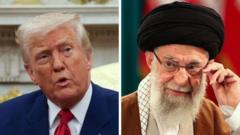In a surprising turn, the fourth round of discussions on Iran's nuclear program between the US and Iran has been postponed. The meeting, which was set to take place in Rome, was delayed due to "logistical and technical reasons," according to officials from Iran and their facilitative partner, Oman. The US, however, noted that the timing for the talks had not been confirmed beforehand.
This development comes amidst continued sanctions imposed by the US, which target Iranian oil and petrochemical transactions. President Donald Trump's recent threats against any entities engaging in such trade underscore the pressure on Tehran, as he pursues what he calls a "better" nuclear deal compared to the one the US abandoned in 2018. Notably, Trump has hinted at military action should the renewed talks be unsuccessful.
The discussions began in April, with a notable optimistic tone following the initial round held in Muscat, Oman, which both parties described as "constructive." Iran's Foreign Minister Seyed Abbas Araghchi expressed Tehran's unwavering determination to reach a "just and balanced" agreement that assures an end to sanctions and confirms the peaceful nature of its nuclear ambitions.
However, skepticism has arisen from Tehran about the efficacy of the ongoing talks, particularly in light of the US's newly imposed sanctions, which Iran interprets as indicative of inconsistency and a lack of sincere intent from the American side.
The US State Department maintained that the postponement does not imply a collapse in negotiations, suggesting a future meeting may still occur soon, with Oman's foreign minister noting that a subsequent date would be decided collectively. Despite the postponement, both nations seem to understand the precarious balance they must maintain to avoid escalating into war.
Amidst this uncertainty, Trump's administration continues to push for a comprehensive dismantlement of Iran's nuclear program, a stance met with resistance from Tehran, which insists on its right to enrichment for peaceful purposes. The situation is further complicated by Iran's backing of regional allies such as the Houthis in Yemen, prompting additional concerns from Washington regarding regional stability.
As the world watches these developments closely, the prospects for a successful agreement remain uncertain, with deep-rooted mistrust and geopolitical complexities firmly in play.
This development comes amidst continued sanctions imposed by the US, which target Iranian oil and petrochemical transactions. President Donald Trump's recent threats against any entities engaging in such trade underscore the pressure on Tehran, as he pursues what he calls a "better" nuclear deal compared to the one the US abandoned in 2018. Notably, Trump has hinted at military action should the renewed talks be unsuccessful.
The discussions began in April, with a notable optimistic tone following the initial round held in Muscat, Oman, which both parties described as "constructive." Iran's Foreign Minister Seyed Abbas Araghchi expressed Tehran's unwavering determination to reach a "just and balanced" agreement that assures an end to sanctions and confirms the peaceful nature of its nuclear ambitions.
However, skepticism has arisen from Tehran about the efficacy of the ongoing talks, particularly in light of the US's newly imposed sanctions, which Iran interprets as indicative of inconsistency and a lack of sincere intent from the American side.
The US State Department maintained that the postponement does not imply a collapse in negotiations, suggesting a future meeting may still occur soon, with Oman's foreign minister noting that a subsequent date would be decided collectively. Despite the postponement, both nations seem to understand the precarious balance they must maintain to avoid escalating into war.
Amidst this uncertainty, Trump's administration continues to push for a comprehensive dismantlement of Iran's nuclear program, a stance met with resistance from Tehran, which insists on its right to enrichment for peaceful purposes. The situation is further complicated by Iran's backing of regional allies such as the Houthis in Yemen, prompting additional concerns from Washington regarding regional stability.
As the world watches these developments closely, the prospects for a successful agreement remain uncertain, with deep-rooted mistrust and geopolitical complexities firmly in play.





















